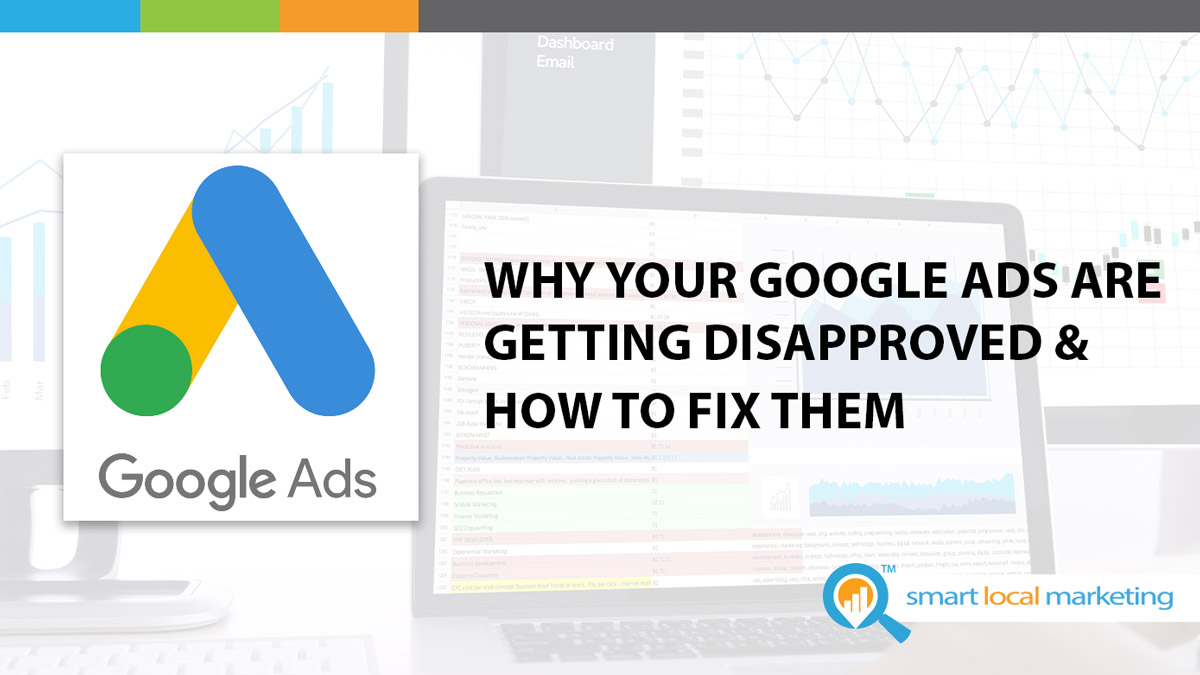
When it comes to online advertising, pay-per-click ads are one of the best models for driving traffic to your website and landing pages. Google AdWords is by far the most well-known option, but that doesn’t mean it’s the easiest to use. Google is notorious for developing complicated rules and algorithmic structures, which can be hard to keep up with all the time.
In many cases, businesses will submit an ad to AdWords only to get a rejection notice. These notices are frustrating, and they can interrupt your marketing momentum. If you’re running a small to medium-sized business, these interruptions can impact your bottom line.
So, with that in mind, we want to take a closer look at some of the top reasons why Google Ads get disapproved and how you can fix them. Here’s what you need to know.
Why Your Google Ads Are Getting Disapproved
Improper Punctuation
Google Ads don’t give you much room to work with, so you must maximize every word, comma, period, and exclamation. Even with such small real estate, many companies will have improper capitalization, spacing, and punctuation.
One common mistake is to capitalize whole words to make them stand out more, such as “BUY NOW” or “GREAT DEAL.” While this tactic isn’t bad per se, it does violate Google’s rules. The only time you can capitalize a whole word and get approved is if it’s a coupon or offer code (i.e., PROMOCODE2021).
Alternative Contact Information
Google makes a lot of money from its pay-per-click model, so it wants to make sure that users will click on your ads. If you provide an alternative way of contacting your business, such as a phone number or QR code, Google will deny your ad.
Realistically, a user could call your company number without clicking, meaning that you’re technically using Google’s massive reach for free.
In that same vein, don’t add text that says “Click Here” since it will confuse people and cause them to avoid your ad altogether.
Unsubstantiated Claims
If you’re going to say that your company is number one, you need to back that up with some evidence. Otherwise, Google will flag your ad for misleading claims.
Other examples could be saying that you’re the “best in the industry” or “better than the competition.”
Unless you have third-party verification (like an independent award), leave the boasting for your landing page and website.
Too Many Exclamations
Did you know that you can only have one exclamation point per Google ad? It’s true!
So, you may have to temper your expectations and use it where it really counts. If every sentence ends with an exclamation, you’ll get denied immediately!
Improper URL Designations
The URL you put in the ad must match the link destination. Even if the two URLs are similar, they should be exact.
So, if you list your website’s homepage but the ad links to a specific landing page, you’ll have to either update the destination or the listing.
For example, don’t put www.mysite.com in the ad and link to www.mysite.com/products.
Inappropriate Content
Depending on your business, you may have to get creative with your advertisements. Google typically forbids adult content like sex, drugs, and gambling.
You should review the complete list of flagged material so that you know how to word your ads. For example, if you run a casino party company, you need to avoid words like betting and winning.
Lengthy Content
Your headline can only be up to 25 characters, and each line can only be 35 characters.
For reference, the words “line can only be 35 characters” is itself 30 characters, so you have to plan accordingly.
How to Fix Google Ads Issues So Your Ads Can Run
Fortunately, most of these mistakes are corrected easily. Here are some tactics to ensure that you won’t get another disapproval notice.
Proofread Your Ad Copy Multiple Times
Again, given that Google Ads are so compact, you would think it’s easy to spot any potential punctuation or spelling mistakes.
However, so many companies get flagged for little things that it’s crucial to pay close attention to each word and character. Reviewing the ad multiple times can also help you avoid other mistakes like an improper URL or too many exclamation points.
Overall, don’t rush your ad copy.
Don’t Try to Do Too Much
Typically, companies will violate Google Ads policies because they’re trying to do too many things in a single ad.
Remember that you can run multiple ads simultaneously, so each one doesn’t have to address various keywords. Instead, it’s better to create customized, hyper-specific advertisements that focus on a single keyword or phrase.
Not only can doing this help you get approved faster, but it can also show you which words generate the most traffic. From there, you can trim the fat and stop paying for ads that don’t convert.
Be Clear and To the Point
Writing Google Ads is tricky the first few times.
One trick that can work is to write the ad without thinking about character counts and trim it from there.
If you’re struggling, consider the essential point of the ad.
Is it to sell a specific product? Is it supposed to get someone to sign up for a subscriber list?
Whatever the call to action is, focus all your attention on that and remove anything that doesn’t support it.
Do You Need Help with your Google Ads?
Even with these tips and tricks, running a successful Google Ads campaign is easier said than done. Fortunately, BizIQ has the tools and know-how to help your business generate more traffic and higher revenue streams. Contact us today to get started and see what we can do for you!

